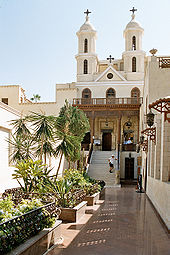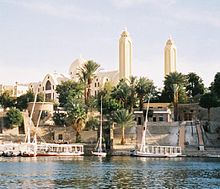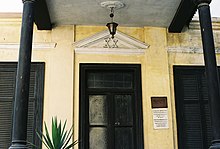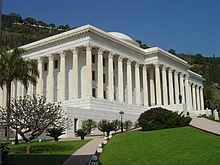Religion in Egypt
| This article is part of a series on |
| Life in Egypt |
|---|
 |
| Culture |
| Society |
| Politics |
| Economy |
|
Egypt portal |
Religion in Egypt controls many aspects of social life and is endorsed by law. Egypt is predominantly Muslim, with Muslims comprising about 90% of a population of around 80 million Egyptians[1][2][3][4][5] Almost the entirety of Egypt's Muslims are Sunnis.[1] Most of the non-Muslims in Egypt are Christians,[1][2][3][4][5] Around 90% of whom belong to the native Coptic Orthodox Church of Alexandria[2][3][4]
Although there are no up-to-date figures on the number of Christians in Egypt due to the fact that the 2006 census counting method did not include the religion, so some published sources such as the Pro-Israel tilted Washington Institute for Near East Policy, as well as some of the Coptic sources, say that Christians represent at least 10% of the total population and claim that they may actually compose up to 15 or even 20% of the Egyptian population.[6] [7] On the other hand, it is not uncommon that to find sources that claim a percentage from about 6% up to the 10%.[8][9][10][11][12][13][14][15]
There is also a small, but nonetheless historically significant, non-immigrant Bahá'í population, estimated around 2000 persons[14], and an even smaller community of Jews about 200,[14][16] then a tiny number of Egyptians who identify as atheist and agnostic. The non-Sunni, non-Coptic communities range in size from several hundreds to a few thousand. The original Ancient Egyptian religion has all but disappeared.
According to the constitution of Egypt, any new legislation must at least implicitly agree with Islamic law however the constitution bans political parties with a religious agenda.[9]

Egypt hosts two major religious institutions. Al-Azhar University, founded in 970 A.D by the Fatimids as the first Islamic University in Egypt and the main Egyptian Church the Coptic Orthodox Church of Alexandria established in the middle of the 1st century by Saint Mark.
In Egypt, Muslims and Christians live as neighbors, they share a common history and national identity, they also share the same ethnicity, race, culture, and language.[17][14]
Religion plays a central role in most Egyptians' lives, The Adhan (Islamic call to prayer) that is heard five times a day has the informal effect of regulating the pace of everything from business to media and entertainment. Cairo is famous for its numerous mosque minarets and is justifiably dubbed "the city of 1,000 minarets",[18] with a significant number of church towers. This religious landscape has been marred by a history of religious extremism,[19] recently witnessing a 2006 judgement of Egypt's Supreme Administrative Court, which made a clear legal distinction between "recognized religions" (i.e., Islam, Christianity, and Judaism) and all other religious beliefs. This ruling effectively delegitimizes and forbids practice of all but the three Abrahamic religions.[20] This judgement had made it necessary for non-Abrahamic religious communities to either commit perjury or be denied Egyptian identification cards (see Egyptian identification card controversy), until a 2008 Cairo court case ruled that unrecognized religious minorities may obtain birth certificates and identification documents, so long as they omit their religion on court documents.[21]

In 2002, under the Mubarak government, Coptic Christmas (January the 7th) was recognized as an official holiday,[22] though Copts complain of being minimally represented in law enforcement, state security and public office, and of being discriminated against in the workforce on the basis of their religion.[23] The Coptic community, as well as several human rights activists and intellectuals (such as Saad Eddin Ibrahim and Tarek Heggy), maintain that the number of Christians occupying government posts is not proportional to the number of Copts in Egypt. Of the 32 cabinet ministers, two are Copts: The successful Finance Minister Dr. Youssef Boutros Ghali and the Minister of Environment Magued George; and of the 25 local governors, only one is a Copt (in the Upper Egyptian governorate of Qena). However, Copts have demonstrated great success in Egypt's private business sector;[24] Naguib Sawiris, one of Egyptians successful businessmen and one of the world's wealthiest 100 people is a Copt. At the same time there is a numerous number of private companies shared by both Muslims and Copts.
Freedom of religion and human rights
Religious freedom in Egypt is hampered to varying degrees by discriminatory and restrictive government policies. The Muslim Brotherhood, a nonviolent organization, Egypt’s largest opposition group are negatively affected, according to Human Rights Watch, hundreds of members of the Muslim Brotherhood detained solely for exercising their rights to freedom of expression and association. [25] [26]
Coptic Christians, being the largest religious minority in Egypt, are also negatively affected. Copts have faced increasing marginalization after the 1952 coup d'état led by Gamal Abdel Nasser. Until recently, Christians were required to obtain presidential approval for even minor repairs in churches. Although the law was eased in 2005 by handing down the authority of approval to the governors, Copts continue to face many obstacles in building new churches. These obstacles are not as much in building mosques.[14][27][28]
Muslim and Christian share a common history and national identity, however, at times religious tensions have arisen and individual acts of prejudice and violence occur. [17] The most significant was the 2000-2001 El Kosheh attacks, In which Muslims and Christians were being involved in bloody inter-religious clashes following a dispute between a Muslim and a Christian. "Twenty Christians and one Muslim were killed after violence broke out in the town of el-Kosheh, 440 kilometres (275 miles) south of Cairo".[29] In 2005, In Kafr Salama village, Sharqiya governorate, altercation between a Muslim and a Christian resulted in the death of the Muslim. Muslim villagers later attacked the Abu Sifin Church and several Christian homes, and looted several shops before the authorities restored order.[17] In 2006, one person who was both drunk and mad, attacked three churches in Alexandria left one dead and from 5 to 16 injured, although the attacker was not linked to any organisation.[10][17][30]
While freedom of religion is guaranteed by the Egyptian constitution, according to Human Rights Watch, "Egyptians are able to convert to Islam generally without difficulty, but Muslims who convert to Christianity face difficulties in getting new identity papers and some have been arrested for allegedly forging such documents.[31] The Coptic community, however, takes pains to prevent conversions from Christianity to Islam due to the ease with which Christians can often become Muslim.[32] Public officials, being conservative themselves, intensify the complexity of the legal procedures required to recognize the religion change as required by law. Security agencies will sometimes claim that such conversions from Islam to Christianity (or occasionally vice versa) may stir social unrest, and thereby justify themselves in wrongfully detaining the subjects, insisting that they are simply taking steps to prevent likely social troubles from happening.[33] In 2007, a Cairo administrative court denied 45 citizens the right to obtain identity papers documenting their reversion to Christianity after converting to Islam.[34] However, in February 2008 the Supreme Administrative Court overturned the decision, allowing 12 citizens who had reverted back to Christianity to re-list their religion on identity cards,[13][35] but they will specify that they had adopted Islam for a brief period of time.[36]
Bahá'ís in Egypt, whose population is estimated to be around two thousand persons[14], have long been persecuted, having their institutions and community activities banned. Since their faith is not officially recognized by the state, they were not allowed to use it on their national identity cards. Without valid identity cards Bahá'ís encounter difficulty registering their children in school, opening bank accounts, and establishing businesses.[37] Police also regularly detain those without correct documentation and thus some Bahá'ís frequently stay home to avoid possible arrest.[37] In 2008 a court case allowed Bahá'ís to obtain birth certificates and identification documents, so long as they omit their religion on court documents.[21]
There are Egyptians who identify as atheist and agnostic, but their numbers are largely unknown, as openly advocating such positions risks legal sanction on the basis of apostasy (if a citizen takes the step of suing the 'apostating' person, though not automatically by the general prosecutor). In 2000, an openly atheist Egyptian writer, who called for the establishment of a local association for atheists, was tried on charges of insulting Islam in four of his books.[38]
Religions in Egypt
Recognized religions
Islam

Islam has been the state religion in Egypt since the amendment of the second article of the Egyptian constitution in the year 1980, before which Egypt was recognized as a secular country. The vast majority of Egyptian Muslims are Sunni, with a small Shi'ite community making up the remainder.[39] A significant number of Sunni Egyptians also follow native Sufi orders. [40] Egypt hosts the most important Sunni institution in the world, Al-Azhar University. It is the oldest Islamic institution of higher studies (founded around 970 C.E.), and is considered by many to be the oldest extant university in the world.

Egypt's various social groups and classes apply Islam differently in their daily lives. The literate theologians of Al-Azhar generally reject the popular version of Islam practised by religious preachers and peasants in the countryside, which is heavily Sufi-influenced. Sufism has flourished in Egypt since Islam was first adopted. Most upper- and middle-class Muslims believed either that religious expression is a private matter for each individual or that Islam should play a more dominant role in public life. Islamic religious revival movements, whose appeal cuts across class lines, have been present in most cities and in many villages for a long time.
According to the constitution of Egypt, any new legislation must at least implicitly agree with Islamic law. The mainstream Hanafi school of Sunni Islam is largely controlled by the state, through Wizaret Al-Awkaf (Ministry of Religious Affairs). Al-Awkaf controls all mosques and supervises Muslim clerics. Imams are trained in Imam vocational schools and at Al-Azhar. The ministry supports Sunni Islam and has commissions authorised to give Fatwā judgements on Islamic issues.
Christianity

Copts are not a cultural or ethnic minority but Egyptians whose ancestors embraced Christianity in the first century.[24] The Coptic Christian population in Egypt is the largest Christian community in the Middle East.[11] About 90% of Egypt's Christians are members of the Coptic Orthodox Church of Alexandria.[2][3][4] an Oriental Orthodox Church, established in the 1st century C.E. by Saint Mark. The Church is headed by the Pope of the Coptic Orthodox Church of Alexandria, attests to Egypt's strong Christian heritage. It has a followers of approximately 10 million Christians worldwide; affiliated sister churches are located in Armenia, Ethiopia, Eritrea, India, Lebanon and Syria and considered as the main Coptic churches in the Middle East.
Other native Egyptian Christians are adherents of the Coptic Catholic Church, the Coptic Evangelical Church and various Coptic Protestant denominations. Non-native Christian communities are largely found in the urban regions of Alexandria and Cairo, and are members of the Greek Orthodox Church of Alexandria, the Melkite Greek Catholic Church, the Armenian Apostolic Church, the Roman Catholic Church, the Episcopal Church in Jerusalem and the Middle East, the Maronite Church, the Armenian Catholic Church, the Chaldean Catholic Church, the Syriac Catholic Church, or the Syriac Orthodox Church.
Significant minorities within Egypt's Christian community include the following denominations:[4]
- Apostolic Catholic and Orthodox Churches:
- The Coptic Catholic Church (an Eastern Catholic Church) has around 210,000 [4] members in Egypt and roughly 50,000 adherents abroad. It is in union with the Pope in Rome. It is headed by the Coptic Catholic Patriarch of Alexandria, currently Antonios Naguib.
- The Greek Orthodox Church of Alexandria (an Eastern Orthodox Church) has around 350,000[4] adherents in Egypt, out of whom approximately 45,000 are of Greek (Hellenic) descent. The Church has another 1.5 million adherents in Africa and between 10,000 and 15,000 ex-patriates in Europe, North and South America. The current Greek Orthodox Patriarch of Alexandria is Pope Theodoros II.[41]
- The Melkite Greek Catholic Church (an Eastern Catholic Church) has about 7,000[4] members in Egypt. The eparchy of Egypt is looked after by a Protosyncellus, and has between 35,000 and 50,000 ex-patriates in Europe, North and South America, and Australia.
- The Armenian Apostolic Church (an Oriental Orthodox Church) has around 7,000[4] adherents in Egypt. Most of them follow the Holy See of Echmiadzin in Armenia, rather than the Holy See of Cilicia in Lebanon.
- The Roman Catholic Church has around 7,000[4] adherents in Egypt. Most are citizens born in Egypt but of foreign descent, like Italians, Maltese and French, or members of the foreign diplomatic corps in Egypt. There are very few native Christian Egyptians who adhere to the Roman Catholic Church, and those who do (several hundreds) do so mainly through marriage.
- The Episcopal Church in Jerusalem and the Middle East (a Protestant Church known in Egypt as the Anglican Church) has between 10,000 and 15,000 members in Egypt.
- The Maronite Church (an Eastern Catholic Church) has around 5,000[4] adherents in Egypt.
- The Armenian Catholic Church (an Eastern Catholic Church) has around 1,200[4] adherents in Egypt.
- The Chaldean Catholic Church (an Eastern Catholic Church) has about 500[4] members in Egypt.
- The Syriac Catholic Church (an Eastern Catholic Church) has around 2,000[4] adherents in Egypt.
- The Syriac Orthodox Church (an Oriental Orthodox Church) has a very small population in Egypt, numbering between 450 and 500. Most are students of the Catechetical School of Alexandria, or foreign students studying in Egyptian universities.

- The Protestant churches also exist in Egypt, bringing the total number of Protestant denominations in Egypt to around 200,000.[4] they are:
- The Coptic Evangelical Church (a Protestant Church) has around 140,000 members in Egypt.
- The Assemblies of God Church, which has arround 40,000 adherents in Egypt.
- The Free Methodist Church, which has 120 churches and has around 10,000 adherents in Egypt.
- The Christian Brethren Church, which has around 5,000 adherents in Egypt.
- The Pentecostal Church of God, which has Church around 3,500 adherents in Egypt.
- The Pentecostal Holiness Church, which has 1,400 adherents in Egypt.
- The Church of God of Prophecy, which has 1,100 adherents in Egypt.
- The Seventh-day Adventist Church has 852 adherents in Egypt.
Judaism

Before 1956 and according to the 1947 census Egyptian Jews were 65,639 who were mostly Karaites, participated in all aspects of Egypt's social, economic, and political life; one of the most ardent Egyptian nationalists, Yaqub Sanu' (Abu Naddara), was Jewish, as were the famous musician Dawoud Husni, popular singer Leila Mourad, and prominent filmmaker Togo Mizrahi. For a while, Jews from across the Ottoman Empire and Europe were attracted to Egypt due to the relative harmony that characterized the local religious landscape in the 19th and early 20th centuries. After the 1956 Suez Crisis, a great number of Jews were expelled by Gamal Abdel Nasser. Their Egyptian citizenship was revoked and their properties were confiscated. A steady stream of emigration of Egyptian Jews followed, reaching a peak after the Six-Day War with Israel in 1967. Today, Jews in Egypt number fewer than 200.[14][42]
Unrecognised beliefs and religions
Bahá'í Faith
- Main articles: Persecution of Bahá'ís in Egypt and Egyptian identification card controversy

The Bahá'í Faith was Founded in Iran in the 19th century, the movement’s spiritual and administrative homes are now respectively located in Akka and Haifa, Israel. "Informal estimates about Bahá'ís population in Egypt suggest that there are approximately 2,000 Bahá'ís currently resident in Egypt."[43] They have been traditionally marginalized as a religious community in Egypt, and recently found themselves in court battling for the right to indicate their faith on their identification cards. On 6 April 2006, however, "a landmark ruling by the Administrative Court recognis[ed] the right of Egyptian Baha'is to have their religion acknowledged on official documents.[43] On 3 May 2006, the Khaleej Times reported that "[t]he Egyptian government will appeal against a court ruling in favour of the rights of the country’s small Baha’i minority." [44]

Notable quotations from ministers in the Egyptian government and parliamentarians taken from the article include:[citation needed]
- Religious Endowments Minister Mahmoud Hamdi Zakzouk told parliament the government would base its appeal on the opinion of the :country’s leading Muslim cleric, the Sheikh of al-Azhar, that Baha’ism [sic] is not a “revealed religion” recognised by Muslims.[citation needed]
- One member of parliament, Gamal Akl of the opposition Muslim Brotherhood, said the Baha’is were infidels who should be killed on the grounds that they had changed their religion.[citation needed]
- “The problem with the Baha’is they are moved by Israeli fingers. We wish the Ministry of the Interior would not yield to the cheap blackmail of this deviant group,” added another Muslim Brotherhood member, Mustafa Awadallah.[citation needed]
- “there is an interest in them being known rather than unknown so that they do not succeed in infiltrating the ranks of society and spreading their extremist and deviant ideology.”[citation needed]
According to Reuters Alertnet, the judgement of 6 April was suspended on 15 May: "Egypt's Supreme Administrative Court decided on 15 May to suspend the implementation of an earlier lower court ruling that allowed Bahais to have their religion recognised on official documents."[45]
On 16 December 2006, after only one hearing, the High Court of Egypt ruled against the Bahá'ís, stating that the government would not recognize their Faith in official identification cards.[20] The ruling left Bahá'ís unable to obtain ID cards, birth certificates, or death certificates.[20] They cannot get marriage or divorce certificates or passports, nor can they be employed, educated, treated in hospitals, or vote.[46][47][48]
On January 29, 2008 Cairo's court of Administrative Justice, ruling on two related court cases, ruled in favour of the Bahá'ís, allowing them to obtain birth certificates and identification documents, so long as they omit their religion on court documents.[21] The ruling accepted the compromise solution offered by the Bahá'ís, allowing for them to obtain identification papers without the Bahá'í Faith being officially recognized.[49][50]
Atheism and agnosticism
There are Egyptians who identify as atheist and agnostic; till 2008 only one case is reported, but their numbers are unknown as openly advocating such positions risks legal sanction on the basis of apostasy (this occurs only if a citizen takes the step of suing the person engaging in apostasy, not automatically by the general prosecutor). In 2000, an openly atheist Egyptian writer, who called for the establishment of a local association for atheists, was tried on charges of insulting Islam in four of his books.[38]
References
- ^ a b c "Egypt from "The World Factbook"". American Central Intelligence Agency (CIA). September 4, 2008.
- ^ a b c d "Egypt from "U.S. Department of State/Bureau of Near Eastern Affairs"". United States Department of State. September 30, 2008.
- ^ a b c d "Egypt from "Foreign and Commonwealth Office"". Foreign and Commonwealth Office -UK Ministry of Foreign Affairs. August 15, 2008.
- ^ a b c d e f g h i j k l m n o "Egypt Religions & Peoples from "LOOKLEX Encyclopedia"". LookLex Ltd. September 30, 2008.
- ^ a b "Egypt from "msn encarta"". Encarta. September 30, 2008.
- ^ ""The Copts and Their Political Implications in Egypt"". Washington Institute for Near East Policy. October 25, 2005.
- ^ Morrow, Adam (April 24, 2006). ""EGYPT: Attacks Raise Fear of Religious Discord"". Inter Press Service. Retrieved 2008-10-08.
- ^ "Egypt from "HRW WORLD ATLAS"". Holt, Rinehart and Winston. September 30, 2008.
- ^ a b Abdelhadi, Magdi (October 6, 2005). "Egypt may allow first Islamist party". BBC NEWS. Retrieved 2008-10-02.
- ^ a b Miles, Hugh (April 15, 2006). "Coptic Christians attacked in churches". The Telegraph. Retrieved 2008-10-07.
- ^ a b Cole, Ethan (July 8, 2008). "Egypt's Christian-Muslim Gap Growing Bigger". The Christian Post. Retrieved 2008-10-02.
- ^ "Cairo – Religion and Faith in Modern Cairo". The Center of Middle Eastern Studies at the University of Texas at Austin (MENIC). October 2, 2008.
- ^ a b Audi, Nadim (February 11, 2008). "Egyptian Court Allows Return to Christianity". New York Times. Retrieved 2008-10-07.
- ^ a b c d e f g ""Egypt, International Religious Freedom Report 2008"". Bureau of Democracy, Human Rights, and Labor. September 19, 2008.
- ^ Nafaa, Hassan (July 12, 2007). "Egypt and the Zionist plan of division". Al-Ahram Weekly. Retrieved 2008-10-04.
- ^ Jewish Community Council (JCC) of Cairo. Bassatine News. 2006.
- ^ a b c d ""Egypt, International Religious Freedom Report 2006"". Bureau of Democracy, Human Rights, and Labor. September 15, 2006.
- ^ Robin Barton (2001-02-19). "Cairo: Welcome to the city of 1,000 minarets". London: The Independent.
- ^ U.S. Department of State (2004-09-15). "Egypt: International Religious Freedom Report". Bureau of Democracy, Human Rights, and Labor. Retrieved 2006-10-20.
- ^ a b c Egyptian Initiative for Personal Rights (2006-12-16). "Government Must Find Solution for Baha'i Egyptians". eipr.org. Retrieved 2006-12-16.
- ^ a b c Johnston, Cynthia (2008-01-29). "Egypt Baha'is win court fight over identity papers". Reuters. Retrieved 2008-01-30. Cite error: The named reference "reuters" was defined multiple times with different content (see the help page).
- ^ ArabicNews.com. Copts welcome Presidential announcement on Eastern Christmas Holiday. December 20, 2002.
- ^ Human Rights Watch. Egypt: Overview of human rights issues in Egypt. 2005
- ^ a b M. Ibrahim, Youssef (April 18, 1998). ""U.S. Bill Has Egypt's Copts Squirming"". New York Time. Retrieved 2008-10-08.
- ^ ""Egypt: Crackdown on Muslim Brotherhood Deepens"". Human Rights Watch. December 18, 2006.
- ^ ""Egypt: Muslim Brotherhood Detainees Face Military Tribunals"". Human Rights Watch. February 15, 2007.
- ^ WorldWide Religious News. Church Building Regulations Eased. December 13, 2005.
- ^ Compass Direct News. Church Building Regulations Eased. December 13, 2005.
- ^ ""Egyptian court orders clashes retrial"". BBC News. July 30, 2001.
- ^ BBC. Egypt church attacks spark anger, April 15, 2006.
- ^ Human Rights Watch. World report 2007: Egypt.
- ^ EGYPT: NATIONAL UNITY AND THE COPTIC ISSUE. 2004
- ^ Egypt: Egypt Arrests 22 Muslim converts to Christianity. November 03, 2003
- ^ Shahine, Gihan. "Fraud, not Freedom". Ahram Weekly, 3 - May 9, 2007
- ^ Associated Press. Egypt court upholds right of converted Muslims to return to Christianity. 2008-02-09.
- ^ AFP. Egypt allows converts to revert to Christianity on ID. February, 2008.
- ^ a b U.S. Department of State (2006-09-15). "Egypt: International Religious Freedom Report". Bureau of Democracy, Human Rights, and Labor. Retrieved 2007-05-08.
- ^ a b Halawi, Jailan (21-December 27, 2000). "Limits to expression". Al-Ahram Weekly.
{{cite news}}: Check date values in:|date=(help) Cite error: The named reference "note6" was defined multiple times with different content (see the help page). - ^ "Egyptian people section from the World Factbook". World Fact Book. Retrieved 2007-01-29.
- ^ Hoffman, Valerie J. Sufism, Mystics, and Saints in Modern Egypt. University of South Carolina Press, 1995.
- ^ Pope Theodoros II
- ^ Jewish Community Council (JCC) of Cairo. Bassatine News. 2006.
- ^ a b IRIN (2006-05-16). "EGYPT: Court suspends ruling recognising Bahai rights". Reuters. Retrieved 2008-03-28.
- ^ Khaleej Times Online - State to appeal ruling that favours Egypt’s Baha’is
- ^ [1][dead link]
- ^ Nkrumah, Gamal (2006-12-21). "Rendered faithless and stateless". Al-Ahram weekly. Retrieved 2007-10-18.
- ^ Mayton, Joseph (2006-12-19). "Egypt's Bahais denied citizenship rights". Middle East Times. Retrieved 2006-12-28.
- ^ Zayan, Jailan (2006-12-15). "Test for Egypt religious freedom in Bahai verdict". Middle East Times. Retrieved 2007-10-18.
- ^ AFP (2008-01-30). "Egypt's Bahais score breakthrough in religious freedom case". AFP. Retrieved 2008-01-30.
- ^ BWNS (2008-01-30). "Egypt court upholds Baha'i plea in religious freedom cases". Bahá'í World News Service.
